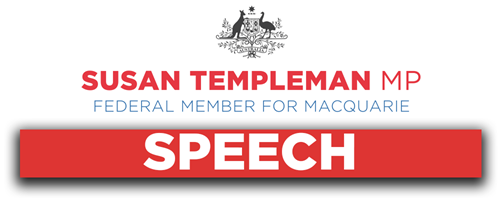
Australia is the mammal extinction capital of the world. That's not something we should be proud of, but it's a legacy that we've been left with due to insufficient efforts to protect our precious native plants and animals. The Albanese government wants to leave nature better off for future generations, and that includes better protecting our precious native plants and animals. We're determined to turn things around and we're taking actions like setting a goal of zero new extinctions to give a clear signal that we want to save our threatened species. We're investing over $500 million to better protect threatened plants and animals and to tackle invasive species, and we're investing $200 million to clean up urban rivers and waterways, which are home to nearly a quarter of our threatened plants and half our threatened animals. I look forward to making a local announcement around that soon.
We've launched the Threatened Species Action Plan, which sets out a pathway for threatened species conservation and recovery over the next 10 years. We've got a target of protecting and conserving at least 30 per cent of Australia's land and 30 per cent of our oceans by 2030. That's to restore habitat that these threatened species call home. So far we've protected an extra 40 million hectares of Australian ocean and bush. That is an area bigger than Germany. We're doubling the number of Indigenous rangers and investing in 10 new Indigenous protected areas. We've invested $1.2 billion to protect and restore the Great Barrier Reef, which should be there for future generations. We're rescuing the Murray-Darling Basin Plan, and we're tripling the size of the Macquarie Island Marine Park to better protect things like the penguins, albatross and seals that live there.
We are seeking people's input on a plan to declare war on feral cats. We have opened consultation on a new
action plan to stop feral cats from decimating native wildlife and driving vulnerable native species to the brink of extinction. We know that cats kill two billion reptiles, birds and mammals every year. That's almost six million every night. In places like the Blue Mountains and Hawkesbury, many responsible domestic cat owners do the right thing. We're not talking domestic cats here; we're talking those feral ones. The plan is available for public consultation until December, and I urge you to take a look at it.
No-one will be surprised to hear me talk about koalas as one of the key threatened species in my electorate. It is incumbent on every level of government to work on protections for our koala population. It is very concerning to learn that data on wildlife has gone missing because that makes it harder in New South Wales to know what things have been going on, and I note that the environment minister in New South Wales was deeply concerned to find that out and is working on it. I also want to urge our local councils to not use codes to clear bush that should be there for koala habitat, to not find dodgy ways around things and to not allow developers to do that, because the habitat we have—the koala habitat in the Hawkesbury—is absolutely crucial. Every day at the moment I'm seeing videos on Facebook and social media because koalas are out and active. The young ones are being kicked out of their mums' area, and it's coming into breeding season and they're going walkabout. We are very lucky in the Hawkesbury to have koalas in our backyards, and we need to keep it that way.


